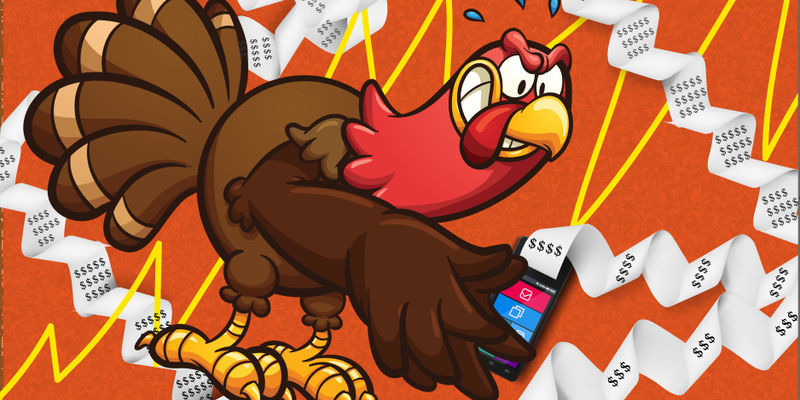Gobblenomics: As the inflation rates goes down, so may the price of your turkey
Ahead of Thanksgiving, Joshua Mask, an assistant professor of instruction in the Economics Department at Temple University’s College of Liberal Arts, discusses how inflation will affect turkey dinners this holiday.

Over the last several years, it’s been impossible to avoid the headlines when it comes to inflation.
“US inflation at 9.1%, a record high” and “2022 inflation hit a 41-year record” are just a couple of examples.
One of the areas where inflation typically hits wallets hardest is in relation to food shopping, as the average American shops for groceries twice per week. Many Americans’ grocery bill is going to be a bit heftier ahead of the Thanksgiving holiday, as they prepare to host guests for a traditional turkey dinner.
But, how much of the increased cost this year is related to inflation, and how much just comes with the territory of hosting a large holiday dinner?
Joshua Mask is an assistant professor of instruction in the Economics Department at Temple University’s College of Liberal Arts. His research focuses on the business cycle and how it affects wages and opportunities in the long run.
Temple Now caught up with Mask to get a better understanding of just how inflation might affect Thanksgiving dinners this holiday season.
Temple Now: As of late, in the news, we have read a lot about inflation going down. So, how do you expect that will impact Thanksgiving dinners, especially when we have continually heard about the high price of groceries in recent years?
 Joshua Mask: The most important thing to note is that while the inflation rate is going down, the price level will not. The price level is like altitude, while the inflation rate is like the speed at which you're running up a mountain. We were sprinting up the mountain in 2021, and now, we're back to slowly walking up the mountain.
Joshua Mask: The most important thing to note is that while the inflation rate is going down, the price level will not. The price level is like altitude, while the inflation rate is like the speed at which you're running up a mountain. We were sprinting up the mountain in 2021, and now, we're back to slowly walking up the mountain.
The inflation rate is about 2.6%, which is close to a normal steady rate. While we're not running up the hill as fast anymore, we are at a higher altitude than in 2019, meaning that overall prices are greater than they were in 2019. One big reason for this is that wages are greater in 2024 than they were in 2019. Economists expect to see prices increasing at a slower rate, but we're not going to return to 2019 prices.
The good news is that this long-term sticky inflation tends to persist more in services than in goods. Because supply chains have been repaired and there is now ample supply to meet demand, you could see some things that you buy at the grocery store go down in price. However, don't expect your haircuts to fall in price.
TN: Your mention of groceries is a nice segue to my next question. How do you expect inflation to affect folks’ Thanksgiving dinners this year?
Mask: Grocery prices, on average, are 1.1% higher than last year. That is across the board, so that includes milk, cereal and everything. So, there have been some increases, but that is going to be because of the service component. The truck drivers, the people that are stocking the shelves, the farmers, everyone: They have higher wages now. So, that then is passed along to food items.
For individual items like turkey, turkey is seeing a 12% decrease from last year. Last year, it was quoted at $2.36 a pound, whereas now it’s at $2.08 a pound. And, here in Philadelphia, there are a lot of sales going on right now, so while I don’t know the exact price, it’s fair to say it’s slightly cheaper here locally than it was last year. Now, some of that has to do with the rate of inflation falling, but I think the bigger piece of this is probably the bird flu.
Last year, egg prices were really affected by that. I don't think turkey specifically was targeted with the bird flu, but I think in general, that caused a lot of distortions in grocery market prices. And, before that, we know supply chain issues really caused distortions. This year, there does not seem to be anything causing that right now.
TN: So, moving past Thanksgiving, there are a lot more holidays coming up, meaning there are going to be a lot more holiday gatherings with big meals. Is what we are seeing now a good sign of things to come?
Mask: In terms of seeing surprises on grocery prices and stuff like that, we are probably at the point in time where we shouldn't expect anything like that. Now, beyond this holiday season, it is more difficult to predict. Going into next year, with the new administration and tariff policy, that could distort a lot of things again.
But to a large extent, I would say that we've gotten our inflation issue under control. You should expect stability in grocery prices. That doesn’t mean grocery prices will go down. Some individual items will go down, but again, we saw grocery prices increase from last year by about 1.1%. That will continue to be the case. But you need to balance that with this. While grocery prices are going up 1%, how much are your wages going up per year? Because really, what's important to you, is the rate at which your wages are outpacing grocery store inflation. So, if your wages are going up 5% every year, you're getting a 4% gain. So, everybody wants to separate their wage gains from inflation. But these two things are related. Prices and wages go up together, and the goal for you as an individual worker is to make sure your wages are outpacing those prices. They’re both going to go up.
Also read
-
Liberal arts at Temple: Prepare for the ever-changing global landscape, where advances in technology and social dynamics occur every day, with an education from the College of Liberal Arts.
-
Economics at Temple: Understand social behavior and business conduct from an economist’s perspective with the bachelor of arts in economics in the College of Liberal Arts at Temple University. This 123-credit undergraduate degree program helps you think critically and logically about the economy.
-
Become an Owl: Learn more about applying for one of our undergraduate, graduate or professional programs.


